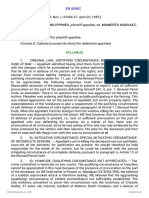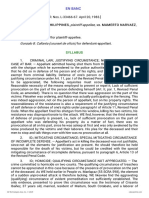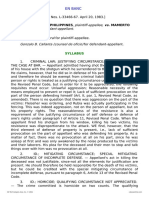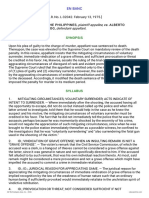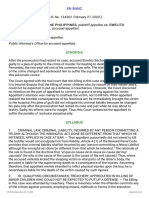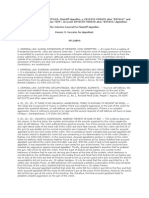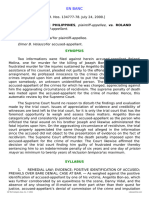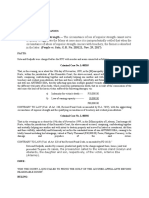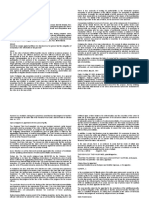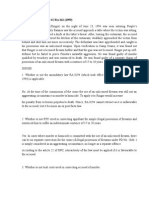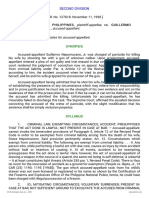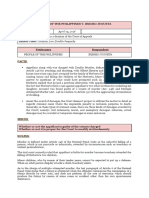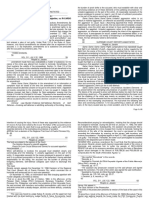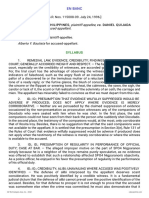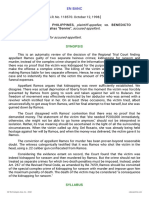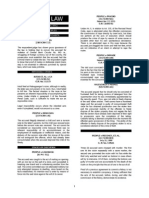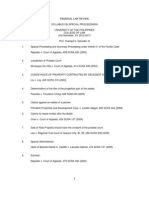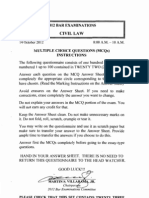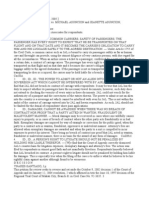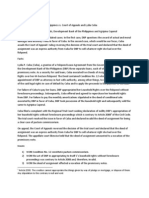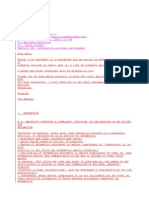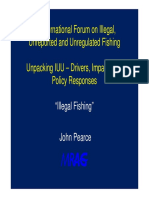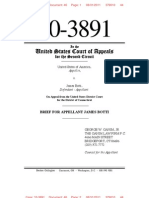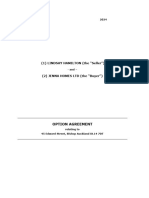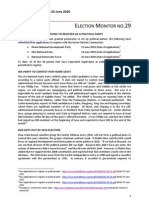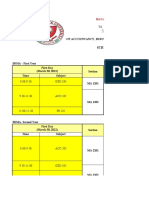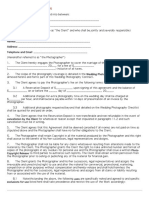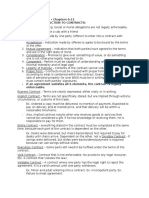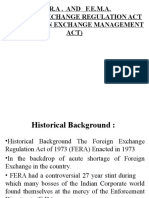People vs. Narvaez
People vs. Narvaez
Uploaded by
Peter Lloyd CarpioCopyright:
Available Formats
People vs. Narvaez
People vs. Narvaez
Uploaded by
Peter Lloyd CarpioCopyright
Available Formats
Share this document
Did you find this document useful?
Is this content inappropriate?
Copyright:
Available Formats
People vs. Narvaez
People vs. Narvaez
Uploaded by
Peter Lloyd CarpioCopyright:
Available Formats
EN BANC [G.R. Nos. L-33466-67. April 20, 1983.] PEOPLE OF THE PHILIPPINES, plaintiff-appellee, vs. MAMERTO NARVAEZ, defendant-appellant.
The Solicitor General for plaintiff-appellee. Gonzalo B. Callanta (counsel de oficio) for defendant-appellant. SYLLABUS 1. CRIMINAL LAW; JUSTIFYING CIRCUMSTANCE; NOT SATISFIED AS THE CASE AT BAR. Appellant admitted having shot them from the window of his house with the shotgun which he surrendered to the police authorities. He claims, however, that he did so in defense of his person and of his rights, and therefore he should be exempt from criminal liability. Defense of one's person or rights is treated as a justifying circumstance under Art. 11, par. I of the Revised Penal Code, but in order for it to be appreciated, the following requisites must occur: Unlawful aggression; Reasonable necessity of the means employed to prevent or repel it; Lack of sufficient provocation on the part of the person defending himself (Art. II, par. 1, Revised Penal Code, as amended). There is no question that there was aggression on the part of the victims: Fleiseher was ordering, and Rubia was actually participating in the fencing. This was indeed aggression, not on the person of appellant, but on his property rights. The reasonableness of the resistance is also a requirement of the justifying circumstance of self defense or defense of one's rights under paragraph I of Article 11, Revised Penal Code. When the appellant fired his shotgun from his window, killing his two victims, his resistance was disproportionate to the attack. WE find, however, that the third element of defense of property is present, i.e., lack of sufficient provocation on the part of appellant who was defending his property. As a matter of fact, there was no provocation at all on his part, since he was asleep at first and was only awakened by the noise produced by the victims and their laborers. His plea for the deceased and their men to stop and talk things over with him was no provocation at all. 2. ID.; MITIGATING CIRCUMSTANCE; SPECIAL MITIGATING CIRCUMSTANCE OF INCOMPLETE DEFENSE. Appellant's act in killing the deceased was not justifiable, since-not all the elements for justification are present. He should therefore be held responsible for the death of his victims, but he could be credited with the special mitigating circumstance of incomplete defense, pursuant to paragraph 6, Article 13 of the Revised Penal Code. 3. ID.; HOMICIDE; QUALIFYING CIRCUMSTANCE NOT APPRECIATED. The crime committed is homicide on two counts. The qualifying circumstance of treachery cannot be appreciated in this case because of the presence of provocation on the part of the deceased. As WE held earlier in People vs. Manlapaz (55 SCRA 598), the element of a sudden unprovoked attack is therefore lacking. WE likewise find the aggravating (qualifying) circumstance of evident premeditation not sufficiently established. The only evidence, presented to prove this circumstance was the testimony of Crisanto Ibaez, 37 years old, married, resident of Maitum, South Cotabato, and a laborer of Fleischer and Company. This single evidence is not sufficient to warrant appreciation of the aggravating circumstance of evident premeditation. As WE have consistently held, there must be "direct evidence of the planning or preparation to kill the victim, . . . it is not enough that premeditation be suspected or surmised, but the criminal intent must be evidenced by notorious outward acts evincing the determination to commit the crime'' (People vs. Ordioles, 42 SCRA 238). 4. ID.; MITIGATING CIRCUMSTANCE; VOLUNTARY SURRENDER. The trial court has properly appreciated the presence of the mitigating circumstance of voluntary surrender, it appearing that appellant surrendered to the authorities soon after the shooting. 5. ID.; ID.; PASSION AND OBFUSCATION. Passion and obfuscation attended the commission of the crime. The appellant awoke to find his house being damaged and its accessibility to the highway as well as of his rice mill bodega being closed. Not only was his house being unlawfully violated; his business was also in danger of closing down for lack of access to the highway. These circumstances, coming so near to the time when his first house was dismantled, thus forcing him to transfer to his only
remaining house, must have so aggravated his obfuscation that he lost momentarily all reason causing him to reach for his shotgun and fire at the victims in defense of hit rights. 6. ID.; PENALTY; REDUCTION IN THE IMPOSITION THEREOF. Article 249 of the Revised Penal Code prescribes the penalty for homicide as reclusion temporal. Pursuant to Article 69, supra, the penalty lower by one or two degrees shall be imposed if the deed is not wholly excusable by reason of the lack of some of the conditions required to justify the same. Considering that the majority of the requirements for defense of property are present, the penalty may be lowered by two degrees, i.e., to prision correccional, And under paragraph 5 of Article 64, the same may further be reduced by one degree, i.e., arresto mayor because of the presence of two mitigating circumstances and no aggravating circumstance. 7. ID.; CIVIL LIABILITY; MODIFICATION. The civil liability of the appellant should be modified. In We case of Zulueta vs. Pan American World Airways (43 SCRA 397), the award for moral damages was reduced because the plaintiff contributed to the gravity of defendant's reaction. In the case at bar, the victims not only contributed but they actually provoked the attack by damaging appellant's properties and business. Considering appellant's standing in the community, being married to a municipal councilor, the victims' actuations were apparently designed to humiliate him and destroy his reputation. Thus, the moral and material suffering of appellant and his family deserves leniency as to his civil liability. 8. ID.; PENAL STATUTE; RETROACTIVE EFFECT APPLIED IN THE CASE AT BAR. Article 39 of the Revised Penal Code requires a person convicted of prision correccional or arrests mayor and fine who has no property with which to meet his civil liabilities to serve a subsidiary imprisonment at the rate of one (1) day for each P2.50. However, the amendment introduced by Republic Act No. 5465 on April 21, 1969 made the provision of Art. 39 applicable to fines only and not to reparation of the damage caused, indemnification of consequential damages and costs of proceedings. Considering that Republic Act 5465 is favorable to the accused who is not a habitual delinquent, it may be given retroactive effect pursuant to Article 22 of the Revised Penal Code. GUTIERREZ, Jr., J., separate opinion: 1. CRIMINAL LAW; JUSTIFYING CIRCUMSTANCES; SELL DEFENSE; DEFENSE OF PROPERTY; INVOKED ONLY WHEN COUPLED WITH SOME FORM OF ATTACK ON PERSON OF ONE ENTRUSTED WITH SAID PROPERTY. Defense of property is not of such importance as the right to life and defense of property can only be invoked when it is coupled with some front of attack on the person of one entrusted with said property. The defense of property, whether complete or incomplete, to be available in prosecutions for murder or homicide must be coupled with an attack by the one getting the property on the person defending it. 2. ID.; ID.; ID.; UNLAWFUL AGGRESSION; ABSENT IN CASE AT BAR. In the case now before Us, there is absolutely no evidence that an attack was attempted, much less made upon the person of appellant. The mere utterance "No, gademit, proceed, go ahead" is not the unlawful aggression which entitles appellant to the plea of self defense. I agree with the majority opinion that the crime is homicide but without any privileged mitigating circumstance. 3. ID.; HOMICIDE; PENALTY; LOWERED BY TWO GENERIC MITIGATING CIRCUMSTANCES. Since the appellant is guilty beyond reasonable doubt of two (2) homicides, mitigated by the two generic mitigating circumstances of voluntary surrender and obfuscation, without any aggravating circumstance, the maximum sentence the appellant should have served was prision mayor plus the indemnification to each group of heirs of Davis Fleischer and of Flamiano Rubia of the sum of Four Thousand (P4,000.00) Pesos, without subsidiary imprisonment, but without any award for moral damages and attorney's fees. DECISION MAKASIAR, J p: This is an appeal from the decision of the Court of First Instance of South Cotabato, Branch I, in
Criminal Cases Nos. 1815 and 1816 for murder which, after a joint trial, resulted in the conviction of the accused in a decision rendered on September 8, 1970, with the following pronouncement: "Thus, we have a crime of MURDER qualified by treachery with the aggravating circumstance of evident premeditation offset by the mitigating circumstance of voluntary surrender. The proper penalty imposable, therefore, is RECLUSION PERPETUA (Arts. 248 and 64, Revised Penal Code). "Accordingly, finding Mamerto Narvaez guilty beyond reasonable doubt of the crime of murder, "(a) In Criminal Case No. 1815, he is hereby sentenced to RECLUSION PERPETUA, to indemnify the heirs of the deceased Davis Q. Fleischer in the sum of P12,000,00 as compensatory damages, P10,000.00 as moral damages, P2,000.00 as attorney's fees, the offended party having been represented by a private prosecutor, and to pay the costs; "(b) In Criminal Case No. 1816, he is hereby sentenced to RECLUSION PERPETUA, to indemnify the heirs of the deceased Flaviano Rubia in the sum of P12,000.00 as compensatory damages, P10,000.00 as moral damages, P2,000.00 as attorney's fees, the offended party having been represented by a private prosecutor, and to pay the costs" (p. 48, rec.). The facts are summarized in the People's brief, as follows: "At about 2:30 in the afternoon of August 22, 1968, Graciano Juan, Jesus Verano and Cesar Ibaez, together with the two deceased Davis Fleischer and Flaviano Rubia, were fencing the land of George Fleischer, father of deceased Davis Fleischer. The place was in the boundary of the highway and the hacienda owned by George Fleischer. This is located in the municipality of Maitum, South Cotabato. At the place of the fencing is the house and rice drier of appellant Mamerto Narvaez (pp. 179-182, t.s.n., Pieza II). At that time, appellant was taking his rest, but when he heard that the walls of his house were being chiselled, he arose and there he saw the fencing going on. If the fencing would go on, appellant would be prevented from getting into his house and the bodega of his ricemill. So he addressed the group, saying -'Pare, if possible you stop destroying my house and if possible we will talk it over - what is good,' addressing the deceased Rubia, who is appellant's compadre. The deceased Fleischer, however, answered: 'No, gademit, proceed, go ahead.' Appellant apparently lost his equilibrium and he got his gun and shot Fleischer, hitting him. As Fleischer fell down, Rubia ran towards the jeep, and knowing there is a gun on the jeep, appellant fired at Rubia, likewise hitting him (pp. 127-133, t.s.n., Defense transcript). Both Fleischer and Rubia died as a result of the shooting' (pp. 9-14, t.s.n., Pieza I; pp. 8-9, Appellant's Brief, p. 161, rec.). It appears, however, that this incident is intertwined with the long drawn out legal battle between the Fleischer and Co., Inc. of which deceased Fleischer was the secretary-treasurer and deceased Rubia the assistant manager, on the one hand, and the land settlers of Cotabato, among whom was appellant. LibLex From the available records of the related cases which had been brought to the Court of Appeals (CA-G.R. Nos. 28858-R and 50583-R) and to this Court on certiorari (G.R. No. L-26757 and L-45504), WE take judicial notice of the following antecedent facts: Appellant was among those persons from northern and central Luzon who went to Mindanao in 1937 and settled in Maitum, a former sitio of Kiamba, and now a separate municipality of South Cotabato. He established his residence therein, built his house, cultivated the area, and was among those who petitioned then President Manuel L. Quezon to order the subdivision of the defunct Celebes Plantation and nearby Kalaong Plantation totalling about 2,000 hectares, for distribution among the settlers. Shortly thereafter, Fleischer and Company, headed by George W. Fleischer, an American landowner in Negros Oriental, filed sales application No. 21983 on June 3, 1937 over the same area formerly leased and later abandoned by Celebes Plantation Company, covering 1,017.2234 hectares. Meanwhile, the subdivision was ordered and a public land surveyor did the actual survey in 1941 but the survey report was not submitted until 1946 because of the outbreak of the second world war. According to the survey, only 300 hectares identified as Lots Nos. 22, 26 and 38, Ps. 176 Kiamba, were set aside for Sales Application No. 21983, while the rest were subdivided into sublots of 5 to 6 hectares each to be
distributed among the settlers (pp. 32-33, G.R. No. L-45504). The 300 hectares set aside for the sales application of Fleischer and Company was declared open for disposition, appraised and advertised for public auction. At the public auction held in Manila on August 14, 1948, Fleischer and Company was the only bidder for P6,000.00. But because of protests from the settlers the corresponding award in its favor was held in abeyance, while an investigator was sent by the Director of Lands to Kiamba in the person of Atty. Jose T. Gozon. Atty. Gozon came back after ten days with an amicable settlement signed by the representative of the settlers. This amicable settlement was later repudiated by the settlers, but the Director of Lands, acting upon the report of Atty. Gozon, approved the same and ordered the formal award of the land in question to Fleischer and Company. The settlers appealed to the Secretary of Agriculture and Natural Resources, who, however, affirmed the decision in favor of the company. On May 29, 1950, the settlers filed Civil Case No. 240 in the Court of First Instance of Cotabato which then consisted only of one sala, for the purpose of annulling the order of the Secretary of Agriculture and Natural Resources which affirmed the order of the Director of Lands awarding the contested land to the company. The settlers, as plaintiffs, lost that case in view of the amicable settlement which they had repudiated as resulting from threats and intimidation, deceit, misrepresentation and fraudulent machination on the part of the company. They appealed to the Court of Appeals (CA-G.R. No. 28858-R) which likewise affirmed on August 16, 1965 the decision of the Court of First Instance in favor of the company. This resulted in the ouster of the settlers by an order of the Court of First Instance dated September 24, 1966, from the land which they had been occupying for about 30 years. Among those ejected was the appellant who, to avoid trouble, voluntarily dismantled his house, built in 1947 at a cost of around P20,000.00, and transferred to his other house which he built in 1962 or 1963 near the highway. The second house is not far from the site of the dismantled house. Its ground floor has a store operated by Mrs. June Talens who was renting a portion thereof. He also transferred his store from his former residence to the house near the highway. Aside from the store, he also had a rice mill located about 15 meters east of the house, and a concrete pavement between the rice mill and the house, which is used for drying grains and copra. On November 14, 1966, appellant was among the settlers on whose behalf Jose V. Gamboa and other leaders filed Civil Case No. 755 in the Court of First Instance of Cotabato, Branch I, to obtain an injunction or annulment of the order of award with prayer for preliminary injunction. During the pendency of this case, appellant on February 21, 1967 entered into a contract of lease with the company whereby he agreed to lease an area of approximately 100 to 140 square meters of Lot No. 38 from the company (Exh. 9, p. 1, Folder of Exhibits for Defense) for a consideration of P16.00 monthly. According to him, he signed the contract although the ownership of the land was still uncertain, in order to avoid trouble, until the question of ownership could be decided. He never paid the agreed rental, although he alleges that the milling job they did for Rubia was considered payment. On June 25, 1968, deceased Fleischer wrote him a letter with the following tenor: "You have not paid six months rental to Fleischers & Co., Inc. for that portion of land in which your house and ricemill are located as per agreement executed on February 21, 1967. You have not paid even after repeated attempts of collection made by Mr. Flaviano Rubia and myself. "In view of the obvious fact that you do not comply with the agreement, I have no alternative but to terminate our agreement on this date. "I am giving you six months to remove your house, ricemill, bodega, and water pitcher pumps from the land of Fleischers & Co., Inc. This six-month period shall expire on December 31, 1966. "In the event the above constructions have not been removed within the six-month period, the company shall cause their immediate demolition" (Exhibit 10, p. 2, supra). On August 21, 1968, both deceased, together with their laborers, commenced fencing Lot 38 by putting bamboo posts along the property line parallel to the highway. Some posts were planted right on the
concrete drier of appellant, thereby cutting diagonally across its center (pp. 227-228, t.s.n., Vol. 2), with the last post just adjacent to appellant's house (p. 231, t.s.n., supra). The fence, when finished, would have the effect of shutting off the accessibility to appellant's house and rice mill from the highway, since the door of the same opens to the Fleischers' side. The fencing continued on that fateful day of August 22, 1968, with the installation of four strands of barbed wire to the posts. prcd At about 2:30 p.m. on the said day, appellant who was taking a nap after working on his farm all morning, was awakened by some noise as if the wall of his house was being chiselled. Getting up and looking out of the window, he found that one of the laborers of Fleischer was indeed chiselling the wall of his house with a crowbar (p. 129, t.s.n., Vol. 6), while deceased Rubia was nailing the barbed wire and deceased Fleischer was commanding his laborers. The jeep used by the deceased was parked on the highway. The rest of the incident is narrated in the People's Brief as above-quoted. Appellant surrendered to the police thereafter, bringing with him shotgun No. 1119576 and claiming he shot two persons (Exh. P, p. 31, Defense Exhibits). Appellant now questions the propriety of his conviction, assigning the following errors: "First Assignment of Error: That the lower court erred in convicting defendant-appellant despite the fact that he acted in defense of his person; and "Second Assignment of Error: That the court a quo also erred in convicting defendant-appellant although he acted in defense of his rights" (p. 20 of Appellant's Brief, p. 145, rec.). The act of killing of the two deceased by appellant is not disputed. Appellant admitted having shot them from the window of his house with the shotgun which he surrendered to the police authorities. He claims, however, that he did so in defense of his person and of his rights, and therefore he should be exempt from criminal liability. Defense of one's person or rights is treated as a justifying circumstance under Art. 11, par. 1 of the Revised Penal Code, but in order for it to be appreciated, the following requisites must occur: "First. Unlawful aggression; "Second. Reasonable necessity of the means employed to prevent or repel it; "Third. Lack of sufficient provocation on the part of the person defending himself" (Art 11, par. 1, Revised Penal Code, as amended). The aggression referred to by appellant is the angry utterance by deceased Fleischer of the following words: "Hindi, sigue, gademit, avante", in answer to his request addressed to his compadre, the deceased Rubia, when he said, "Pare, hinto mona ninyo at pag-usapan natin kung ano ang mabuti" (pp. 227-229, t.s.n., Vol. 6). This was in reaction to his having been awakened to see the wall of his house being chiselled. The verbal exchange took place while the two deceased were on the ground doing the fencing and the appellant was up in his house looking out of his window (pp. 225-227, supra). According to appellant, Fleischer's remarks caused this reaction in him: "As if, I lost my senses and unknowingly I took the gun on the bed and unknowingly also I shot Mr. Fleischer, without realizing it, I shot Mr. Fleischer" (p. 132, supra). As for the shooting of Rubia, appellant testified: "When I shot Davis Fleischer, Flaviano Rubia was nailing and upon hearing the shot, Mr. Rubia looked at Mr. Fleischer and when Mr. Fleischer fell down, Mr. Rubia ran toward s the jeep and knowing that there was a firearm in the jeep and thinking that if he will take that firearm he will kill me, I shot at him" (p. 132, supra, emphasis supplied). The foregoing statements of appellant were never controverted by the prosecution. They claim, however, that the deceased were in lawful exercise of their rights of ownership over the land in question, when they did the fencing that sealed off appellant's access to the highway. LLphil A review of the circumstances prior to the shooting as borne by the evidence reveals that five persons, consisting of the deceased and their three laborers, were doing the fencing and chiselling of the walls of appellant's house, The fence they were putting up was made of bamboo posts to which were being nailed strands of barbed wire in several layers. Obviously, they were using tools which could be lethal weapons, such as nail and hammer, bolo or bamboo cutter, pliers, crowbar, and other necessary gadgets. Besides, it
was not disputed that the jeep which they used in going to the place was parked just a few steps away, and in it there was a gun leaning near the steering wheel. When the appellant woke up to the sound of the chiselling on his walls, his first reaction was to look out of the window. Then he saw the damage being done to his house, compounded by the fact that his house and rice mill will be shut off from the highway by the fence once it is finished. He therefore appealed to his compadre, the deceased Rubia, to stop what they were doing and to talk things over with him. But deceased Fleischer answered angrily with "gademit" and directed his men to proceed with what they were doing. The actuation of deceased Fleischer in angrily ordering the continuance of the fencing would have resulted in the further chiselling of the walls of appellant's house as well as the closure of the access to and from his house and rice mill which were not only imminent but were actually in progress. There is no question, therefore, that there was aggression on the part of the victims: Fleischer was ordering, and Rubia was actually participating in the fencing. This was indeed aggression, not on the person of appellant, but on his property rights. The question is, was the aggression unlawful or lawful? Did the victims have a right to fence off the contested property, to destroy appellant's house and to shut off his ingress and egress to his residence and the highway? Article 30 of the Civil Code recognizes the right of every owner to enclose or fence his land or tenements. However, at the time of the incident on August 22, 1968, Civil Case no. 755 for annulment of the order of award to Fleischer and Company was still pending in the Court of First Instance of Cotabato. The parties could not have known that the case would be dismissed over a year after the incident on August 22, 1968, as it was dismissed on January 23, 1970 on ground of res judicata, in view of the dismissal in 1965 (by the Court of Appeals) of Civil Case No. 240 filed in 1950 for the annulment of the award to the company, between the same parties, which the company won by virtue of the compromise agreement in spite of the subsequent repudiation by the settlers of said compromise agreement; and that such 1970 dismissal also carried the dismissal of the supplemental petition filed by the Republic of the Philippines on November 28, 1968 to annul the sales patent and to cancel the corresponding certificate of title issued to the company, on the ground that the Director of Lands had no authority to conduct the sale due to his failure to comply with the mandatory requirements for publication. The dismissal of the government's supplemental petition was premised on the ground that after its filing on November 28, 1968, nothing more was done by the petitioner Republic of the Philippines except to adopt all the evidence and arguments of plaintiffs with whom it joined as parties-plaintiffs. Hence, it is reasonable to believe that appellant was indeed hoping for a favorable judgment in Civil Case No. 755 filed on November 14, 1966 and his execution of the contract of lease on February 21, 1967 was just to avoid trouble. This was explained by him during cross-examination on January 21, 1970, thus: "It happened this way: we talked it over with my Mrs. that we better rent the place because even though we do not know who really owns this portion to avoid trouble. To avoid trouble we better pay while waiting for the case because at that time, it was not known who is the right owner of the place. So we decided until things will clear up and determine who is really the owner, we decided to pay rentals" (p. 169, t.s.n., Vol. 6). In any case, Fleischer had given him up to December 31, 1968 (Exh. 10, p. 2, Defense Exhibits) within which to vacate the land. He should have allowed appellant the peaceful enjoyment of his properties up to that time, instead of chiselling the walls of his house and closing appellant's entrance and exit to the highway. The following provisions of the Civil Code of the Philippines are in point: LLjur "Art. 536. In no case may possession be acquired through force or intimidation as long as there is a possessor who objects thereto. He who believes that he has an action or a right to deprive another of the holding of a thing must invoke the aid of the competent court, if the holder should refuse to deliver the thing."
"Art. 539. Every possessor has a right to be respected in his possession; and should he be disturbed therein he shall be protected in or restored to said possession by the means established by the laws and the Rules of Court" (Articles 536 and 539, Civil Code of the Philippines). Conformably to the foregoing provisions, the deceased had no right to destroy or cause damage to appellant's house, nor to close his accessibility to the highway while he was pleading with them to stop and talk things over with him. The assault on appellant's property, therefore, amounts to unlawful aggression as contemplated by law. "Illegal aggression is equivalent to assault or at least threatened assault of immediate and imminent kind" (People vs. Encomiendas, 46 SCRA 522). In the case at bar, there was an actual physical invasion of appellant's property which he had the right to resist, pursuant to Art. 429 of the Civil Code of the Philippines which provides: "Art. 429. The owner or lawful possessor of a thing has the right to exclude any person from the enjoyment and disposal thereof. For this purpose, he may use such force as may be reasonably necessary to repel or prevent an actual or threatened unlawful physical invasion or usurpation of his property" (emphasis supplied). The reasonableness of the resistance is also a requirement of the justifying circumstance of self-defense or defense of one's rights under paragraph 1 of Article 11, Revised Penal Code. When the appellant fired his shotgun from his window, killing his two victims, his resistance was disproportionate to the attack. WE find, however, that the third element of defense of property is present, i.e., lack of sufficient provocation on the part of appellant who was defending his property. As a matter of fact, there was no provocation at all on his part, since he was asleep at first and was only awakened by the noise produced by the victims and their laborers. His plea for the deceased and their men to stop and talk things over with him was no provocation at all. Be that as it may, appellant's act in killing the deceased was not justifiable, since not all the elements for justification are present. He should therefore be held responsible for the death of his victims, but he could be credited with the special mitigating circumstance of incomplete defense, pursuant to paragraph 6, Article 13 of the Revised Penal Code. The crime committed is homicide on two counts. The qualifying circumstance of treachery cannot be appreciated in this case because of the presence of provocation on the part of the deceased. As WE held earlier in People vs. Manlapaz (55 SCRA 598), the element of a sudden unprovoked attack is therefore lacking. cdrep Moreover, in order to appreciate alevosia, "it must clearly appear that the method of assault adopted by the aggressor was deliberately chosen with a special view to the accomplishment of the act without risk to the assailant from any defense that the party assailed might have made. This cannot be said of a situation where the slayer acted instantaneously . . ." (People vs. Caete, 44 Phil. 481). WE likewise find the aggravating (qualifying) circumstance of evident premeditation not sufficiently established. The only evidence presented to prove this circumstance was the testimony of Crisanto Ibaez, 37 years old, married, resident of Maitum, South Cotabato, and a laborer of Fleischer and Company, which may be summarized as follows: "On August 20, 1968 (two days before the incident) at about 7:00 A.M., he was drying corn near the house of Mr. and Mrs. Mamerto Narvaez at the crossing. Maitum, South Cotabato, when the accused and his wife talked to him. Mrs. Narvaez asked him to help them, as he was working in the hacienda. She further told him that if they fenced their house, there is a head that will be broken. Mamerto Narvaez added 'Noy, it is better that you will tell Mr. Fleischer because there will be nobody who will break his head but I will be the one.' He relayed this to Mr. Flaviano Rubia, but the latter told him not to believe as they were only idle threats designed to get him out of the hacienda" (pp. 297-303, t.s.n., Vol. 2). This single evidence is not sufficient to warrant appreciation of the aggravating circumstance of evident premeditation. As WE have consistently held, there must be "direct evidence of the planning or preparation to kill the victim, . . . it is not enough that premeditation be suspected or surmised, but the
criminal intent must be evidenced by notorious outward acts evincing the determination to commit the crime" (People vs. Ordioles, 42 SCRA 238). Besides, there must be a "showing" that the accused premeditated the killing; that the culprit clung to their (his) premeditated act; and that there was sufficient interval between the premeditation and the execution of the crime to allow them (him) to reflect upon the consequences of the act" (People vs. Gida, 102 SCRA 70). Moreover, the obvious bias of witness Crisanto Ibaez, as a laborer of the deceased Davis Fleischer, neutralizes his credibility. Since in the case at bar, there was no direct evidence of the planning or preparation to kill the victims nor that the accused premeditated the killing, and clung to his premeditated act, the trial court's conclusion as to the presence of such circumstance may not be endorsed. Evident premeditation is further negated by appellant pleading with the victims to stop the fencing and destroying his house and to talk things over just before the shooting. But the trial court has properly appreciated the presence of the mitigating circumstance of voluntary surrender, it appearing that appellant surrendered to the authorities soon after the shooting. cdll Likewise, We find that passion and obfuscation attended the commission of the crime. The appellant awoke to find his house being damaged and its accessibility to the highway as well as of his rice mill bodega being closed. Not only was his house being unlawfully violated; his business was also in danger of closing down for lack of access to the highway. These circumstances, coming so near to the time when his first house was dismantled, thus forcing him to transfer to his only remaining house, must have so aggravated his obfuscation that he lost momentarily all reason causing him to reach for his shotgun and fire at the victims in defense of his rights. Considering the antecedent facts of this case, where appellant had thirty years earlier migrated to this so-called "land of promise" with dreams and hopes of relative prosperity and tranquility, only to find his castle crumbling at the hands of the deceased, his dispassionate plea going unheeded - all these could be too much for any man he should be credited with this mitigating circumstance. Consequently, appellant is guilty of two crimes of homicide only, the killing not being attended by any qualifying nor aggravating circumstance, but extenuated by the privileged mitigating circumstance of incomplete defense - in view of the presence of unlawful aggression on the part of the victims and lack of sufficient provocation on the part of the appellant - and by two generic mitigating circumstance of voluntary surrender and passion and obfuscation. Article 249 of the Revised Penal Code prescribes the penalty for homicide as reclusion temporal. Pursuant to Article 69, supra, the penalty lower by one or two degrees shall be imposed if the deed is not wholly excusable by reason of the lack of some of the conditions required to justify the same. Considering that the majority of the requirements for defense of property are present, the penalty may be lowered by two degrees, i.e., to prision correccional. And under paragraph 5 of Article 64, the same may further be reduced by one degree, i.e., arresto mayor, because of the presence of two mitigating circumstances and no aggravating circumstance. cdll The civil liability of the appellant should be modified. In the case of Zulueta vs. Pan American World Airways (43 SCRA 397), the award for moral damages was reduced because the plaintiff contributed to the gravity of defendant's reaction. In the case at bar, the victims not only contributed but they actually provoked the attack by damaging appellant's properties and business. Considering appellant's standing in the community, being married to a municipal councilor, the victims' actuations were apparently designed to humiliate him and destroy his reputation. The records disclose that his wife, councilor Feliza Narvaez, was also charged in these two cases and detained without bail despite the absence of evidence linking her to the killings. She was dropped as a defendant only upon motion of the prosecution dated October 31, 1968. (p. 14, CFI rec. of Crim. Case No. 1816), but acted upon on November 4, 1968 (p. 58, CFI rec. of Criminal Case No. 1815). Moreover, these cases arose out of an inordinate desire on the part of Fleischer and Company, despite its extensive landholdings in a Central Visayan province, to extend its accumulation of public lands to the
resettlement areas of Cotabato. Since it had the capability financial and otherwise to carry out its land accumulation scheme, the lowly settlers, who uprooted their families from their native soil in Luzon to take advantage of the government's resettlement program, but had no sufficient means to fight the big landowners, were the ones prejudiced. Thus, the moral and material suffering of appellant and his family deserves leniency as to his civil liability. Furthermore, Article 39 of the Revised Penal Code requires a person convicted of prision correccional or arresto mayor and fine who has no property with which to meet his civil liabilities to serve a subsidiary imprisonment at the rate of one (1) day for each P2.50. However, the amendment introduced by Republic Act No. 5465 on April 21, 1969 made the provisions of Art. 39 applicable to fines only and not to reparation of the damage caused, indemnification of consequential damages and costs of proceedings. Considering that Republic Act 5465 is favorable to the accused who is not a habitual delinquent, it may be given retroactive effect pursuant to Article 22 of the Revised Penal Code. LibLex WHEREFORE, FINDING APPELLANT GUILTY BEYOND REASONABLE DOUBT OF ONLY TWO (2) HOMICIDES, MITIGATED BY THE PRIVILEGED EXTENUATING CIRCUMSTANCE OF INCOMPLETE SELF-DEFENSE AS WELL AS BY TWO (2) GENERIC MITIGATING CIRCUMSTANCES OF VOLUNTARY SURRENDER AND OBFUSCATION, WITHOUT ANY AGGRAVATING CIRCUMSTANCE, APPELLANT IS HEREBY SENTENCED TO SUFFER AN IMPRISONMENT OF FOUR (4) MONTHS OF ARRESTO MAYOR, TO INDEMNIFY EACH GROUP OF HEIRS OF DAVIS FLEISCHER AND OF FLAVIANO RUBIA IN THE SUM OF FOUR THOUSAND (P4,000.00) PESOS, WITHOUT SUBSIDIARY IMPRISONMENT AND WITHOUT ANY AWARD FOR MORAL DAMAGES AND ATTORNEY'S FEES. CONSIDERING THAT APPELLANT HAS BEEN UNDER DETENTION FOR ALMOST FOURTEEN (14) YEARS NOW SINCE HIS VOLUNTARY SURRENDER ON AUGUST 22, 1968, HIS IMMEDIATE RELEASE IS HEREBY ORDERED. NO COSTS. SO ORDERED. Fernando, C.J., Teehankee, Concepcion, Jr., Guerrero, De Castro, Melencio-Herrera, Escolin, Vasquez and Relova, JJ., concur. Aquino, J., is on leave. Plana, J., concur in the result. Separate Opinions ABAD SANTOS, J., dissenting: I dissent. The self-defense of the Revised Penal Code refers to unlawful aggression on persons, not property. GUTIERREZ, JR., J., dissenting: While I agree with the order to release the appellant, I am constrained to dissent in part. It is true that Art. 429, Civil Code of the Philippines, provides that the owner or legal possessor of a thing may use such force as may be reasonably necessary to repel or prevent an actual or threatened unlawful physical invasion or usurpation of his property. It seems to me, however, that an attack on the person defending his property is an indispensable element where an accused pleads self-defense but what is basically defended is only property. Defense of property is not of such importance as the right to life and defense of property can only be invoked when it is coupled with some form of attack on the person of one entrusted with said property. The defense of property, whether complete or incomplete, to be available in prosecutions for murder or homicide must be coupled with an attack by the one getting the property on the person defending it. prLL In the case now before Us, there is absolutely no evidence that an attack was attempted, much less made upon the person of appellant. The mere utterance "No, gademit, proceed, go ahead" is not the unlawful aggression which entitles appellant to the pela of self-defense. I agree with the majority opinion that the crime is homicide but without any privileged mitigating circumstance.
Therefore, since the appellant is guilty beyond reasonable doubt of two (2) homicides, mitigated by the two generic mitigating circumstances of voluntary surrender and obfuscation, without any aggravating circumstance, the maximum sentence the appellant should have served was prision mayor plus the indemnification to each group of heirs of Davis Fleischer and of Flamiano Rubia of the sum of Four Thousand (P4,000.00) Pesos, without subsidiary imprisonment, but without any award for moral damages and attorney's fees. llcd Considering that appellant has been under detention for almost fourteen (14) years now since August 22, 1968, he has served the penalty and should be released.
You might also like
- People v. NarvaezDocument12 pagesPeople v. NarvaezArren RelucioNo ratings yet
- Plaintiff-Appellee vs. vs. Defendant-Appellant The Solicitor General Gonzalo B. Callanta (Counsel de Oficio)Document12 pagesPlaintiff-Appellee vs. vs. Defendant-Appellant The Solicitor General Gonzalo B. Callanta (Counsel de Oficio)VanityHughNo ratings yet
- Plaintiff-Appellee vs. vs. Defendant-Appellant The Solicitor General Gonzalo B. Callanta (Counsel de Oficio)Document11 pagesPlaintiff-Appellee vs. vs. Defendant-Appellant The Solicitor General Gonzalo B. Callanta (Counsel de Oficio)AdrianNo ratings yet
- Plaintiff-Appellee Defendant-Appellant The Solicitor General Gonzalo B. Callanta (Counsel de Oficio)Document14 pagesPlaintiff-Appellee Defendant-Appellant The Solicitor General Gonzalo B. Callanta (Counsel de Oficio)Andrei Anne PalomarNo ratings yet
- People V AbarcaDocument12 pagesPeople V AbarcalesterjethNo ratings yet
- Plaintiff-Appellee vs. vs. Defendant-Appellant The Solicitor General Alipio V. Flores Emeterio T. BalgunaDocument10 pagesPlaintiff-Appellee vs. vs. Defendant-Appellant The Solicitor General Alipio V. Flores Emeterio T. BalgunaVanityHughNo ratings yet
- 9 People v. Benito y Restubog20160919-3445-Ba568yDocument7 pages9 People v. Benito y Restubog20160919-3445-Ba568yCarlota Nicolas VillaromanNo ratings yet
- 1975-1977 Bar Qs & AsDocument14 pages1975-1977 Bar Qs & AsthebeautyinsideNo ratings yet
- 9-People v. Benito y Restubog20210424-12-140fjoiDocument8 pages9-People v. Benito y Restubog20210424-12-140fjoiAndrei Anne PalomarNo ratings yet
- Plaintiff-Appellee Vs Vs Accused-Appellant Solicitor General Public Attorney's OfficeDocument12 pagesPlaintiff-Appellee Vs Vs Accused-Appellant Solicitor General Public Attorney's OfficeJuanNo ratings yet
- 1983 People - v. - Macariola20190220 5466 Gf0ur6Document13 pages1983 People - v. - Macariola20190220 5466 Gf0ur6Kristen whiteNo ratings yet
- People Vs Tac-AnDocument7 pagesPeople Vs Tac-AnAppleSamsonNo ratings yet
- You Are MineDocument148 pagesYou Are MineReston AGNo ratings yet
- Case No. 1Document5 pagesCase No. 1Elah De LeonNo ratings yet
- People vs. BendecioDocument20 pagesPeople vs. BendecioJustin GarciaNo ratings yet
- 113522-2002-People v. Sitchon y TayagDocument12 pages113522-2002-People v. Sitchon y TayagRonaldo ValladoresNo ratings yet
- Criminalaw NotesfinalDocument15 pagesCriminalaw NotesfinalDinn Glea Marie CadayNo ratings yet
- People v. Gutierrez Jr.Document20 pagesPeople v. Gutierrez Jr.Bea Dominique PiloNo ratings yet
- People v. MolinaDocument17 pagesPeople v. MolinaCarlo Enrique ManalastasNo ratings yet
- People v. Layug G.R. No. 223679, September 27, 2017 RulingDocument4 pagesPeople v. Layug G.R. No. 223679, September 27, 2017 RulingPatricia RodriguezNo ratings yet
- Abuse of Superior Strength - The Circumstance of Use of Superior Strength Cannot ServeDocument7 pagesAbuse of Superior Strength - The Circumstance of Use of Superior Strength Cannot ServeEzra gambicanNo ratings yet
- PrintDocument10 pagesPrintDavid Antonio A. EscuetaNo ratings yet
- Appellee Vs Vs Appellant The Solicitor General Public Attorney's OfficeDocument8 pagesAppellee Vs Vs Appellant The Solicitor General Public Attorney's OfficeJela KateNo ratings yet
- Slight Physical Injury ResearchDocument5 pagesSlight Physical Injury ResearchDee ComonNo ratings yet
- People vs. MolinaDocument23 pagesPeople vs. MolinaFlo PaynoNo ratings yet
- People vs. Ringor, 320 SCRA 342 (1999)Document4 pagesPeople vs. Ringor, 320 SCRA 342 (1999)Clark LimNo ratings yet
- G.R. No. 186412Document18 pagesG.R. No. 186412Jai MendozaNo ratings yet
- CRIM 1 CASE DIGEST - CORPIN - CRL1 - JDNT-1B1 - Felonies - Part2Document11 pagesCRIM 1 CASE DIGEST - CORPIN - CRL1 - JDNT-1B1 - Felonies - Part2JemNo ratings yet
- 7 People V GuillermoDocument10 pages7 People V GuillermoDuffy DuffyNo ratings yet
- Article 13 Revised Penal CODEDocument6 pagesArticle 13 Revised Penal CODEEdziel JoNo ratings yet
- (Iii) Quizon v. Justice of The Peace, G.R. No. L-6641, 28 July 1955Document4 pages(Iii) Quizon v. Justice of The Peace, G.R. No. L-6641, 28 July 1955JMae MagatNo ratings yet
- People vs. Jugueta G.R. No. 202124Document3 pagesPeople vs. Jugueta G.R. No. 202124Lorenz San DiegoNo ratings yet
- Criminal Law CasesDocument2 pagesCriminal Law CasesChristlen DelgadoNo ratings yet
- People vs. JanairoDocument9 pagesPeople vs. Janairoaudrey100% (1)
- People v. YuDocument4 pagesPeople v. YuMartina PratNo ratings yet
- Criminal Law - Light ThreatsDocument4 pagesCriminal Law - Light ThreatsTiffPicartNo ratings yet
- People v. Quijada y CirculadoDocument56 pagesPeople v. Quijada y CirculadoBarrrMaidenNo ratings yet
- G.R. No. L-23000 November 4, 1967 MATEO J. PABULARIO, Petitioner-Appellee, THE HONORABLE POMPEYO L. PALARCA, City Judge of Iligan City, RespondentDocument35 pagesG.R. No. L-23000 November 4, 1967 MATEO J. PABULARIO, Petitioner-Appellee, THE HONORABLE POMPEYO L. PALARCA, City Judge of Iligan City, RespondentJude OnrubiaNo ratings yet
- Plaintiff-Appellee Vs Vs Accused-Appellant The Solicitor General Public Attorney's OfficeDocument17 pagesPlaintiff-Appellee Vs Vs Accused-Appellant The Solicitor General Public Attorney's OfficeShanen LimNo ratings yet
- People vs. Cafe, 166 SCRA 704 People vs. Montejo, 167 SCRA 506Document3 pagesPeople vs. Cafe, 166 SCRA 704 People vs. Montejo, 167 SCRA 506poppy2890No ratings yet
- People v. RamosDocument17 pagesPeople v. RamosKaye RodriguezNo ratings yet
- PP Vs OanisDocument15 pagesPP Vs OanisLORELEI LOUISE A„ORA DELOSONo ratings yet
- De Guzman Jr. V PeopleDocument3 pagesDe Guzman Jr. V PeopleGillian Elliot AlbayNo ratings yet
- 41 - People vs. Sia Teb Ban 54 Phil 52, 53Document2 pages41 - People vs. Sia Teb Ban 54 Phil 52, 53Nilelle payNo ratings yet
- Nicolas Velasquez, Et. Al. vs. People of The PhilippinesDocument19 pagesNicolas Velasquez, Et. Al. vs. People of The PhilippinesLemrose DuenasNo ratings yet
- People vs. UlepDocument18 pagesPeople vs. UlepIñigo Mathay RojasNo ratings yet
- GN 2016 Criminal LawDocument38 pagesGN 2016 Criminal LawMari Erika Joi BancualNo ratings yet
- Quizon v. Justice of The PeaceDocument6 pagesQuizon v. Justice of The PeaceSansa's SmirkNo ratings yet
- R v. Mowatt (1968) 1 Q.B. 421Document9 pagesR v. Mowatt (1968) 1 Q.B. 421Jonathan CelestinNo ratings yet
- 10 People V NepomucenoDocument2 pages10 People V NepomucenoJohn AmbasNo ratings yet
- People V JuguetaDocument12 pagesPeople V JuguetaJeff Madrid100% (1)
- Legal Technique - Mooting CaseDocument4 pagesLegal Technique - Mooting CaseMichael Parreño VillagraciaNo ratings yet
- Criminal Law CasesDocument32 pagesCriminal Law CasesIpah Dante ManonggiringNo ratings yet
- People Vs Alfeche JR PDFDocument16 pagesPeople Vs Alfeche JR PDFKim Muzika PerezNo ratings yet
- People V JuguetaDocument3 pagesPeople V JuguetaEmilio PahinaNo ratings yet
- Plaintiff-Appellee Vs Vs Accused-Appellant The Solicitor General Atty. Henry Y. MudanzaDocument9 pagesPlaintiff-Appellee Vs Vs Accused-Appellant The Solicitor General Atty. Henry Y. MudanzaLeona SanchezNo ratings yet
- People vs. AraquelDocument2 pagesPeople vs. AraquelJanette SumagaysayNo ratings yet
- ITB-IV General Conditions of The ContractDocument13 pagesITB-IV General Conditions of The ContractPeter Lloyd CarpioNo ratings yet
- SPIT Cases - Day 5 - EndDocument624 pagesSPIT Cases - Day 5 - EndPeter Lloyd CarpioNo ratings yet
- REMLAW REV - SPECPRO SyllabusDocument3 pagesREMLAW REV - SPECPRO SyllabusPeter Lloyd CarpioNo ratings yet
- 2012 Civil Bar Exam QDocument29 pages2012 Civil Bar Exam QClambeauxNo ratings yet
- Tax1 Dimaampao Lecture NotesDocument61 pagesTax1 Dimaampao Lecture NotesSui100% (1)
- TRANSPO - Japan Airlines vs. Court of AppealsDocument5 pagesTRANSPO - Japan Airlines vs. Court of AppealsPeter Lloyd CarpioNo ratings yet
- DBP vs. CADocument3 pagesDBP vs. CAPeter Lloyd CarpioNo ratings yet
- Criminal Law Book 2Document88 pagesCriminal Law Book 2lucasNo ratings yet
- Unit-1&2 Engineering MechanicsDocument15 pagesUnit-1&2 Engineering MechanicsVaidyanathan RamakrishnanNo ratings yet
- K8A65D ToshibaDocument6 pagesK8A65D ToshibaMuhammad Nur ArifinNo ratings yet
- Information On Libel and SlanderDocument14 pagesInformation On Libel and SlanderMichaelNo ratings yet
- HSSLiVE-XI-Maths - CH-3 - TRIGONOMETRYDocument11 pagesHSSLiVE-XI-Maths - CH-3 - TRIGONOMETRYsingh vijayNo ratings yet
- Yuval Mendelovich - Long VersionDocument4 pagesYuval Mendelovich - Long VersionCatherine WalshNo ratings yet
- CivRev BAR Q 1Document2 pagesCivRev BAR Q 1Dianne Bernadeth Cos-agonNo ratings yet
- Sitaram Motiram Vs Keshav Ramchandra On 18 September, 1945Document13 pagesSitaram Motiram Vs Keshav Ramchandra On 18 September, 1945RainhatNo ratings yet
- Illegal FishingDocument15 pagesIllegal FishingWahida Kartika SariNo ratings yet
- 3rd Year LLB 6th Semester PDFDocument14 pages3rd Year LLB 6th Semester PDFMoon GandhiNo ratings yet
- Section 6 of The Transfer of Property Act, 1882Document8 pagesSection 6 of The Transfer of Property Act, 1882Harshat SinghNo ratings yet
- FUNGSI 3 MonitorDocument5 pagesFUNGSI 3 Monitoroctavian ekaNo ratings yet
- Botti Appeal BriefDocument44 pagesBotti Appeal BriefThe Valley IndyNo ratings yet
- United States v. FortenberryDocument23 pagesUnited States v. FortenberryDaily Caller News FoundationNo ratings yet
- Malolos ConstitutionDocument7 pagesMalolos ConstitutionRYUJIりゅじNo ratings yet
- Ainaro NCB - R 190023Document79 pagesAinaro NCB - R 190023filomeno martinsNo ratings yet
- To Be Print (Sec 126-198)Document8 pagesTo Be Print (Sec 126-198)JasNo ratings yet
- 45 Edward Street Option AgreementDocument13 pages45 Edward Street Option Agreementnimraazher6No ratings yet
- 30jun10 EM - No - 29 - 30-06-10Document6 pages30jun10 EM - No - 29 - 30-06-10taisamyoneNo ratings yet
- National Liga NG Mga Barangay vs. Paredes Class NotesDocument6 pagesNational Liga NG Mga Barangay vs. Paredes Class NotesOnnie LeeNo ratings yet
- Conclusion and Prayer For ReliefDocument26 pagesConclusion and Prayer For ReliefShivank VirmaniNo ratings yet
- Letter of Indemnity enDocument1 pageLetter of Indemnity enMUCHTAR RAFIINo ratings yet
- Republic of The Philippines Malvar, Batangas Tel. Nos. (043) 778-2170/ (043) 406-0830 Local 116Document54 pagesRepublic of The Philippines Malvar, Batangas Tel. Nos. (043) 778-2170/ (043) 406-0830 Local 116Jonathan MontealtoNo ratings yet
- The Thirteen Colonies and The British Empire 1607-1750Document5 pagesThe Thirteen Colonies and The British Empire 1607-1750TheGreatHelper50% (2)
- Wedding Photography Contract PDFDocument2 pagesWedding Photography Contract PDFDouglas WiesenthalNo ratings yet
- Reet Harsh & Shivam RajDocument7 pagesReet Harsh & Shivam RajAYUSH PANDEYNo ratings yet
- Essentials of Business Law - Test Review Chapter 6-12 Key TermsDocument6 pagesEssentials of Business Law - Test Review Chapter 6-12 Key TermsbrendaNo ratings yet
- Anna University Student AffairsDocument6 pagesAnna University Student AffairsVishnu PriyaNo ratings yet
- Fera and FemaDocument18 pagesFera and FemaNiladri BiswasNo ratings yet
- Improper Exercise of Police Power. Lucena Grand Terminal, MMDA, PPIDocument4 pagesImproper Exercise of Police Power. Lucena Grand Terminal, MMDA, PPIRea Rosario MaliteNo ratings yet

